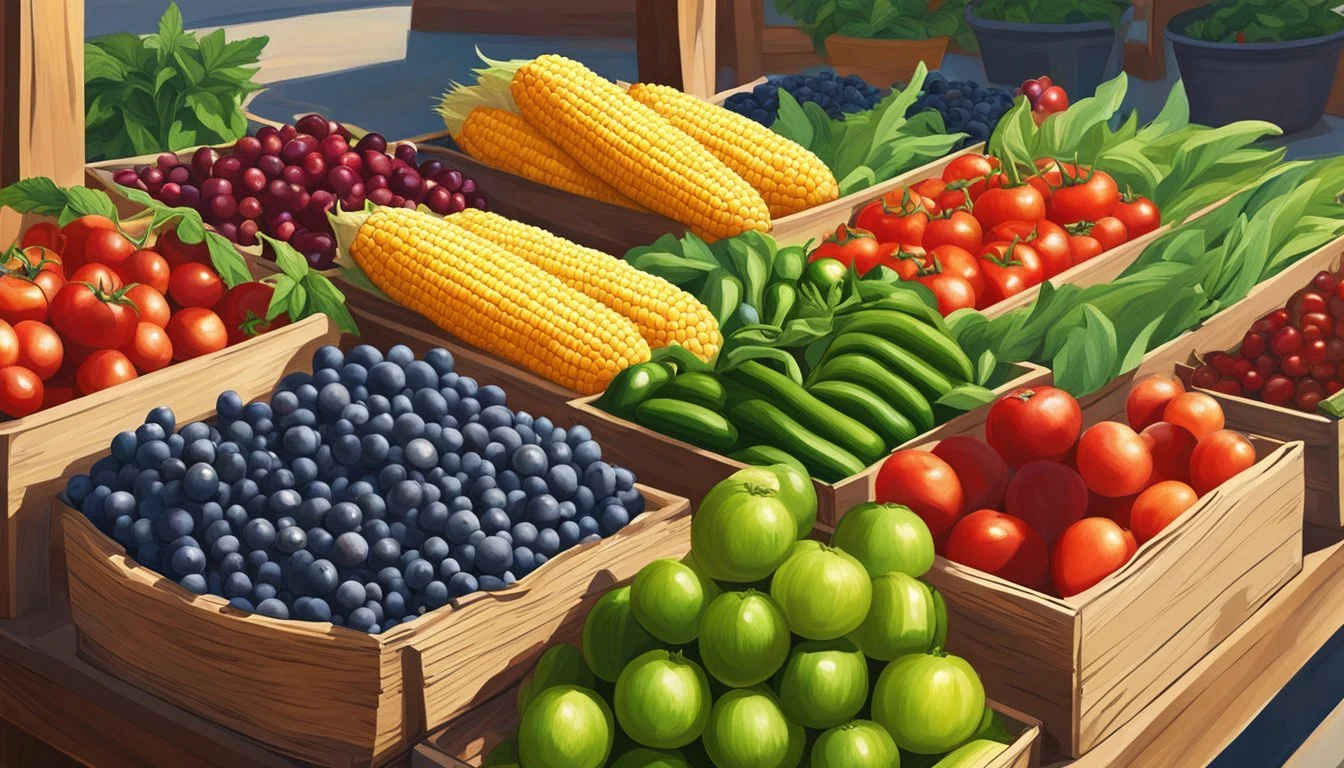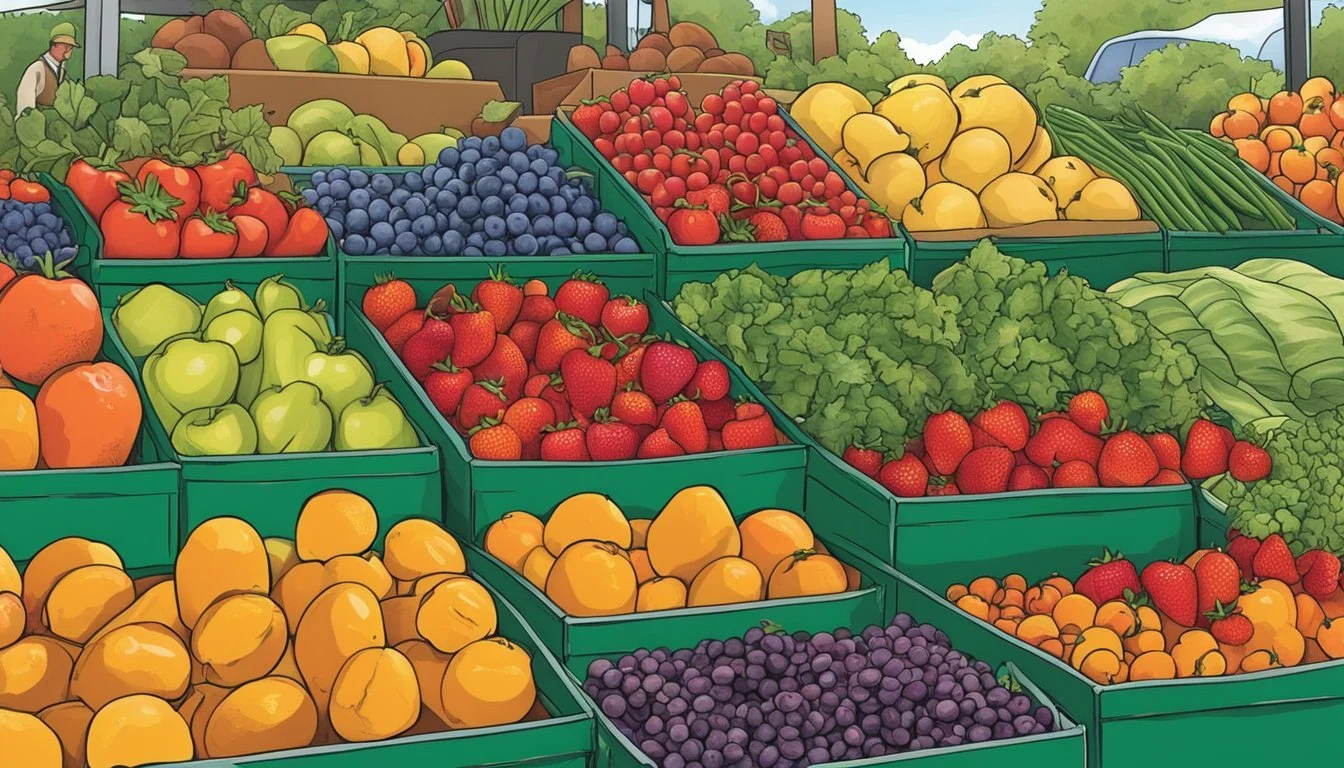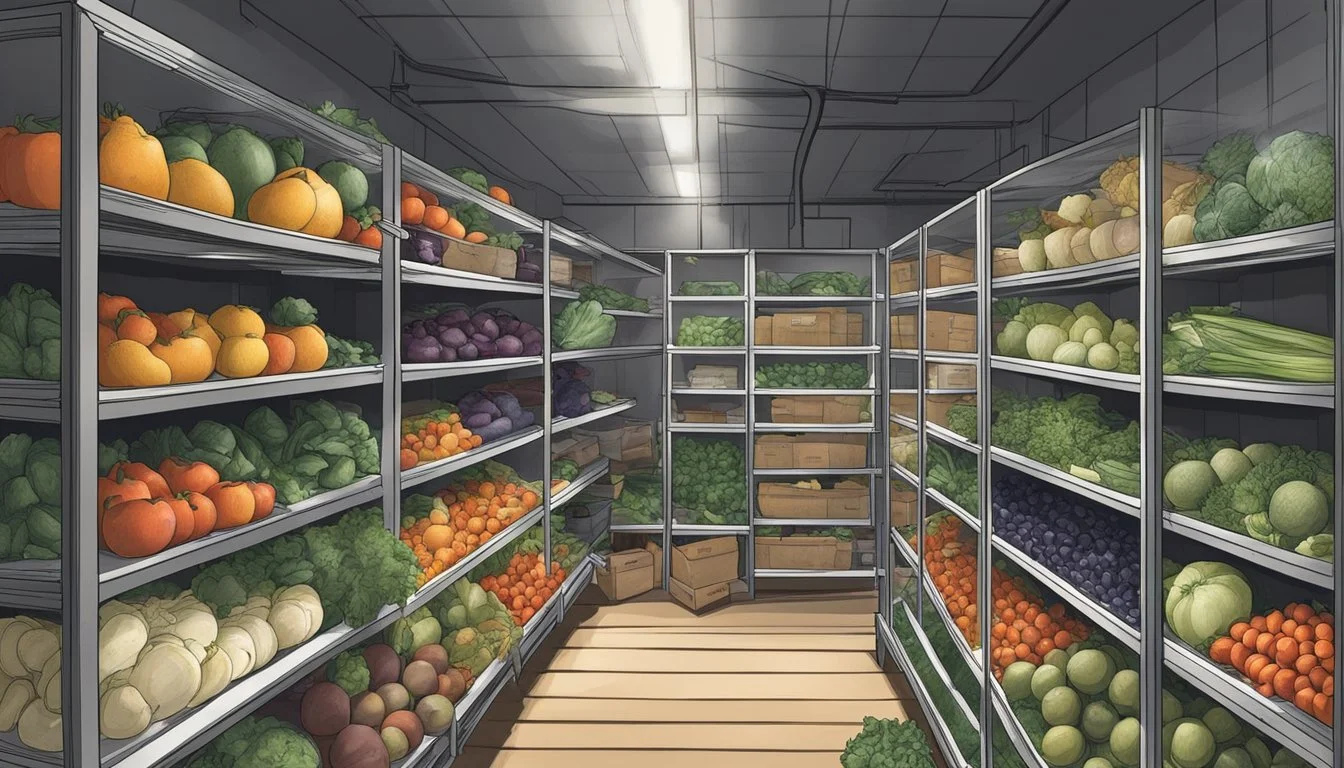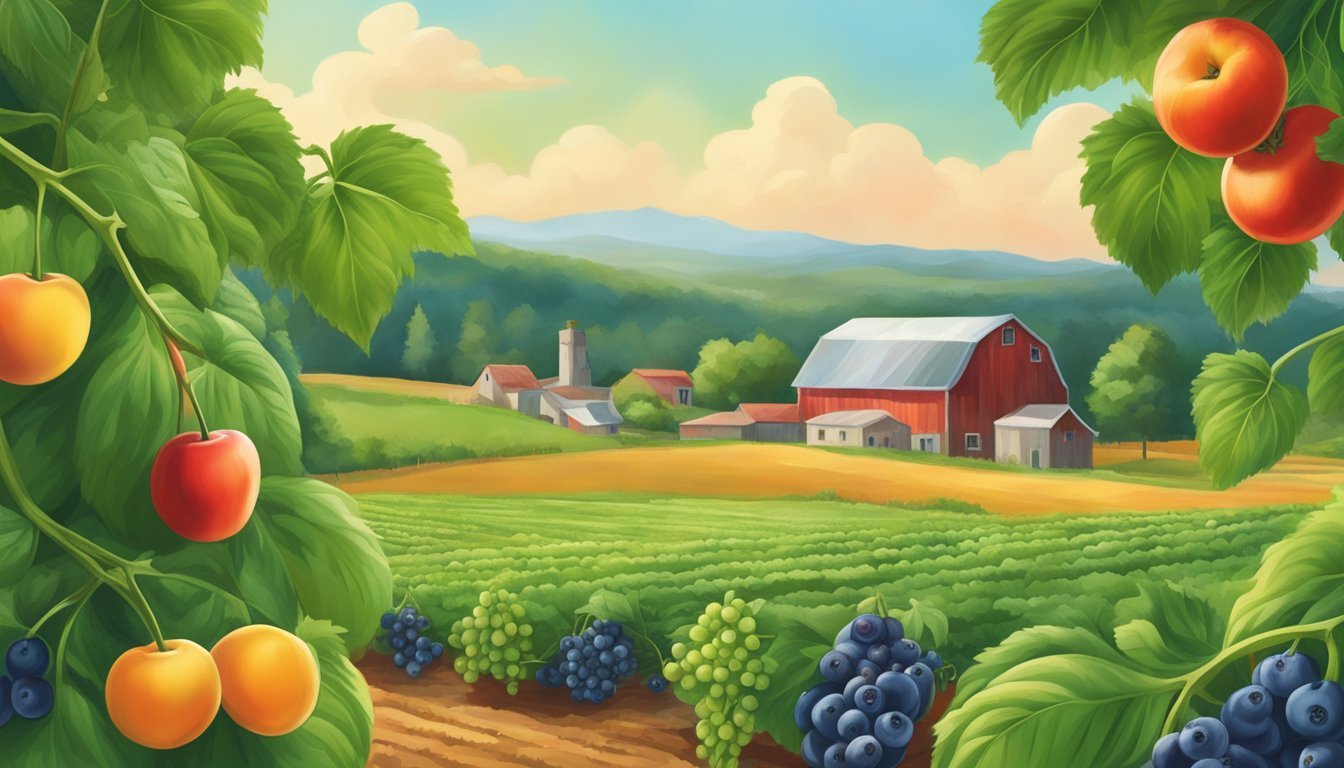Michigan Seasonal Fruit & Vegetables in July
Your Guide to Fresh Produce
This Article is Part of our Michigan Seasonal Fruit & Veg Calendar
In Michigan, July is the heart of summer and a peak time for fresh produce. This is when gardens and farms across the state burst with vibrant fruits and vegetables ready for harvest. It's a season celebrated by both chefs and home cooks for the abundant variety of fresh, locally-sourced ingredients available. Farmers' markets and roadside stands showcase the state's agricultural bounty, which includes juicy berries, luscious stone fruits, and a wide range of crisp vegetables.
During this month, Michigan's seasonal offerings include succulent cherries (how long do cherries last?), both sweet and tart varieties, which are typically harvested starting at the end of June through July. Berries also thrive, with raspberries and blackberries making their sweet appearance. The warm July sun nurtures fields of cantaloupes (how long does cantaloupe last?), cucumbers (how long do cucumbers last?), eggplants (What wine goes well with eggplant?), nectarines, and peaches, each ripening to perfection during this time. Meanwhile, peppers add a splash of color and spice to the summer crop lineup.
Vegetable gardens are equally productive, with an array of choices for the picking. Leafy greens continue to grow, albeit more slowly in the summer heat, while beets add earthy flavors to the summer palate. Fresh-picked corn (how long does corn last?), a staple at many summer cookouts, starts its season as well, and tomatoes begin to ripen, promising the start of a delectable harvest that extends well into the fall. Michigan's agricultural landscape in July is a testament to the richness of the season, offering a wealth of fresh produce to enjoy.
Seasonal Overview
In July, Michigan's farms burst with fresh produce, thanks to the state's unique climate and dedicated farmers, marking the peak of the growing season.
Michigan's Agriculture and Climate
Michigan's agricultural output thrives due to a varied climate, which includes cold winters and warm summers. This allows for a wide range of crops. The state benefits from the Great Lakes, which moderate the temperature, creating microclimates conducive to farming. In July, the warmer weather stabilizes, giving many crops the ideal conditions to flourish.
The Growing Season
The growing season in Michigan typically ramps up in April and peaks in the summer months, with July being particularly prolific. Farmers harvest a diverse array of food and crops, including:
Fruits: Raspberries, blueberries (how long do blueberries last?), cherries, peaches, and nectarines.
Vegetables: Cucumbers, eggplants, peppers, and sweet corn.
The resources provided by Michigan's rich soil and adequate rainfall during this period are invaluable, ensuring that both farms and markets provide a bounty of fresh, local produce to consumers.
July's Bounty
July in Michigan ushers in a vibrant array of farm-fresh produce. Markets brim with a colorful selection of fruits and vegetables, offering an ideal opportunity for consumers to savor the peak freshness of local harvests.
Fresh Fruits
Cherries: A beloved summer fruit, cherries reach their juicy prime in July.
Blueberries: Known for their antioxidant properties, they are a healthy and tasty treat.
Raspberries: These delicate berries offer a balance of sweet and tart flavors, perfect for summer desserts.
Peaches: Succulent and aromatic, peaches are a highlight of Michigan's July fruit offerings.
Plums: With a variety of colors and flavors, plums provide a unique sweetness to the summer fruit palette.
Juicy Vegetables
Tomatoes: From vibrant reds to sunny yellows, tomatoes are a staple in summer salads and sandwiches.
Beans: Fresh green beans are crisp and tender, ideal for side dishes or healthy snacks.
Peppers: Ranging from sweet to spicy, peppers add a pop of flavor and color to any dish.
Cucumbers: These refreshing vegetables are a perfect addition to salads, or simply enjoyed on their own.
Corn: Sweet corn is at its peak, offering a taste of classic summertime bliss.
Eggplant: With a versatile flavor, eggplants are excellent grilled, roasted, or as part of a savory ratatouille (What wine goes well with ratatouille?).
Local Farmers Markets
In Michigan, July is a prime month for exploring local farmers markets, where the community connects directly with growers to purchase fresh, seasonal produce. Consumers benefit from the peak harvest, and farmers gain from direct sales.
Market Locations and Calendar
Michigan Farmers Market Association: Utilizing the Market Finder tool, residents in various cities across the state can discover nearby farmers markets operating during the summer season. Each market typically provides:
Operating Hours: Markets may open as early as 9 AM and close by 8 PM, depending on the location.
Days of Operation: Most markets run on specific days like Tuesdays, Thursdays, and weekends.
A common calendar trend is that many markets adjust their operating hours in July to accommodate peak season traffic and the abundance of produce.
Farm-to-Table Initiatives
Community Supported Agriculture (CSA): CSAs in Michigan have gained momentum by enabling residents to subscribe to a share of a local farm's yield. This farm-to-table approach ensures:
Freshness: Shares often include a variety of vegetables and fruits that are in season.
Support for Local Economy: Subscription fees go directly to farmers, bolstering the local agricultural business.
In summary, Michigan's farmers markets serve as a nexus between the farm and the consumer, with distinct locations and a calendar suited to seasonal availability, all while supporting farm-to-table initiatives through programs like CSAs.
Health Benefits
Consuming fresh produce in July aligns with peak harvest times, ensuring that individuals have access to foods with optimal nutrition. Seasonal fruits and vegetables can offer a variety of health benefits due to their freshness and reduced time between harvest and consumption.
Nutritional Value of Seasonal Foods
In July, Michigan offers an abundance of seasonal fruits and vegetables, each packed with essential vitamins, minerals, and antioxidants. Below is a breakdown of some key nutritional components these foods provide:
Fruits:
Blueberries: High in vitamin C, fiber, and antioxidant properties.
Apricots: Good source of vitamin A, potassium, and fiber.
Vegetables:
Beets (how long do beets last?): Contain folate, manganese, and nitrates which may improve blood flow.
Radishes: Low in calories and high in vitamin C.
Green beans: Provide a good amount of fiber, vitamin K, and silicon.
Incorporating these foods into one's diet can contribute to a stronger immune system, better digestive health, and enhanced overall well-being. They also contribute significant hydration, which is particularly beneficial during the warm summer months. Fresh, in-season produce typically retains more nutrients compared to out-of-season or stored fruits and vegetables, making them a healthier choice. Eating locally and seasonally not only supports good health but also promotes environmental sustainability and local economies.
Preserving and Storing
In Michigan, the bounty of July's harvest offers an excellent opportunity for preserving fruits and vegetables to ensure their quality and flavor endures well into the winter months. Proper storage and preservation techniques allow one to extend the enjoyment of seasonal foods.
Canning and Freezing Techniques
Canning: To capture the peak flavor of July's fresh produce, canning is an effective method. It involves:
Sterilizing jars and lids to prevent contamination.
Preparing produce using tested recipes to ensure safety and taste.
Processing in a water bath or pressure canner to seal and preserve.
Freezing: Freezing is one of the best ways to preserve the nutrient density of fruits and vegetables. Steps include:
Selecting high-quality, ripe produce to ensure the best flavor and nutrient retention.
Washing and preparing the food, such as cutting or blanching, before freezing.
Packaging the produce in airtight containers or freezer bags to prevent freezer burn.
For both methods, one should always refer to trusted resources to confirm proper techniques and timings, as these play a crucial role in the safety and success of preserving efforts.
Supporting the Local Economy
When individuals purchase Michigan's seasonal fruits and vegetables in July, they are investing in the regional prosperity and sustainability. This practice strengthens local businesses and farms, reinforcing the economic fabric of the community.
Impact of Shopping Locally
Farmers Markets in various regions across the state offer a direct channel for consumers to buy fresh produce and contribute to the state's economy. Shopping locally at these markets allows money to circulate within the community, benefiting local businesses and farms.
Economic Contribution: When consumers choose to shop at a farmers market, they help boost the local economy by supporting the growers and producers within their region.
Community Advancement: By patronizing local businesses, residents help create jobs and foster community development.
State Prosperity: The collective effect of local purchasing supports Michigan's agricultural sector, which is a cornerstone of the state's economy.
Sustainability: Local shopping reduces transportation needs, contributing to a lower carbon footprint and a more sustainable community.
Purchasing from farms and local businesses has a significant multiplier effect, as it stimulates the economy through the support of ancillary services such as transportation and retail. Each transaction strengthens the link between consumers and the local agriculture community in Michigan, ensuring economic vitality for future generations.
Seasonal Recipes
July in Michigan offers an abundance of fresh, flavorful produce perfect for summer recipes. This is the time when one can truly savor the state's agricultural bounty through creative cooking.
Cooking with July Produce
Michigan's July harvest includes a variety of fruits and vegetables that are ripe for the picking and ideal for the kitchen. Here's how to make the most of them:
Fruit Dishes: Fresh berries like strawberries, raspberries, blueberries, and blackberries can be used in desserts, salads, or simply enjoyed on their own. Peaches and nectarines, both sweet and juicy, make great pies or can be grilled for a smoky, summer flavor.
Fruit Recipe Suggestion Blueberries Blueberry crumble or muffins Peaches Grilled peaches with ice cream
Vegetable Creations: Summer vegetables like beets, cucumbers, and peppers can be transformed into vibrant salads, salsas, or pickled sides. Sweet corn, one of July's prime picks, can be enjoyed off the cob as a salad mixed with avocado and goat cheese or simply grilled to perfection.
Vegetable Recipe Suggestion Sweet Corn Grilled corn with chili lime butter Beets Roasted beet salad with goat cheese
Cooking with seasonal produce not only enhances the flavor of food but also supports local agriculture. By choosing locally sourced fruits and vegetables, one ensures the freshness and nutrient content of their meals.





